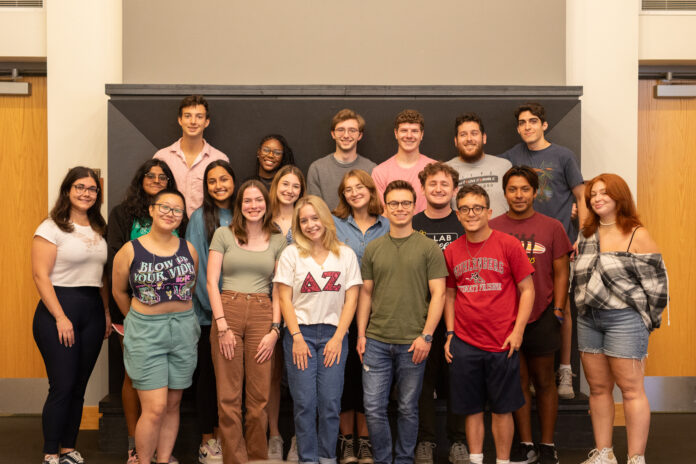Muhlenberg’s Student Government Association (SGA) met for their third General Assembly of the semester on Sept. 13, 2023. Leading the meeting, Vice President Andrew Buckwalter ‘24, who also serves as the head of SGA’s Standards Committee, teased an upcoming vote regarding bylaws to come later in the approved agenda. Other students, such as Finance Committee Chair and Treasurer Evan Lipman ‘24, Campus Engagement Chair Aidan Silvestri ‘25, Diversity, Equity, Inclusion & Belonging (DEI&B) Chair Bethany Qian ‘25 and Institutional Committees Chair and President Jake Forstein ‘24 commented on their committees’ progress thus far, mostly noting conversations with campus groups regarding SGA collaboration.
Vivian Jaber ‘24, student representative and head of the Commuter Resources Ad Hoc Committee, discussed her new role as Muhlenberg’s first commuter advisor after her appointment by Tim Black, the director of student transitions and family programs. Jaber and Black are currently in the planning stages of converting the Taylor Hall basement into a commuter lounge. This is an ongoing revitalization process, with no stated opening date.
The meeting then shifted to “SGA Member Training,” an introductory description of SGA’s structure and role at Muhlenberg. Created by Recording Secretary Noah Berger ‘24, the presentation outlined SGA’s overarching responsibilities to “Create large-scale events for students on the campus of Muhlenberg, discuss the issues that the student body is facing and work to alleviate those concerns and misconceptions, fund clubs and organizations, as well as individuals, complete big projects that relate to and benefit the Muhlenberg community, represent and advocate for the needs of the student body and work to create positive change!”
Midway through the training, Silvestri took the mic to discuss SGA’s updated club approval process, which she hopes will make the process more transparent and thorough for both clubs and SGA. The goal is to give club leaders the resources needed to feel prepared for their pitch at the General Assembly. Those interested in creating clubs will typically meet with her and/or Natalie Shaw, the assistant director of student organizations, leadership, and engagement, where they’ll be presented with all details and get aid throughout the process.
Berger returned to offer commentary on constituents, stating that while SGA meetings have historically lacked constituents, described as “any member of the Muhlenberg community who is interested in coming to SGA to understand what is on our agenda,” the new board aims to make General Assembly meetings “accessible and inviting for all members of the Muhlenberg community.” Forstein doubled down on how fun SGA meetings can be, excitedly stating that they love a game of musical chairs. “It’s a tradition [at the end of the semester]—we play musical chairs, and when you get out, you have to say your favorite part of the semester.”
Berger transitioned into a reintroduction and explanation of SGA’s Ambassador Program, which requires that each SGA member is assigned to a few clubs to serve as a direct link between the club’s leadership and SGA.
“It’s about connecting as individuals with these clubs and being there for them in the way they need us to be.”
Jake Forstein ’24
Next on the agenda was the first bylaw vote of the semester regarding the Paige Exclusion Clause. Named for previous Muhlenberg Weekly Senior Staff Writer Paige Weisburg ‘22, the clause previously stated that “All Executive Board positions (excluding the Recording Secretary) must be full-time students…” and “Recording Secretary must be a full-time student with easy access to the campus for the fall semester, as these are not required to be full year term.” The proposed amendment was “All Executive Board Positions must be full-time students…,” and removes the second part of the clause. Conversations regarding specific language were tabled until the next standards committee meeting.
The voting was conducted using a two-step voting process. SGA board members first vote via Google Form, then verbally, as Forstein commented that they didn’t want a system that enforced group-think—the idea that people vote based on previous voting members’ choices. “It encourages more individual thought,” Forstein concluded.
This concept of individuality as SGA board members was repeated throughout the meeting, with executive board members continuously encouraging their peers to vote or comment based on what they believe, regardless of the perceived popular opinion. The vote passed unanimously, finalizing that all SGA executive board positions, including the Recording Secretary, are a year long (fall and spring).
SGA continues to encourage all students to attend their General Assembly and committee meetings, which are open to all students. Director of Communications Margery Leit ‘24 concluded by advertising that, as stated in a social media post, the General Assembly meets on Wednesdays from 5:30-7:00 p.m. in the Seegers Great Room, and committee meetings vary throughout the week. SGA hopes to see many student constituents present at meetings this semester. For more information, follow @bergstudentgov on Instagram.
Harry Glicklin '26 is a media & communication and English double major who is absolutely jazzed to be both a Copy Editor and a writer for The Muhlenberg Weekly. Outside of ~the office~, Harry is a member of the Muhlenberg AcaFellas, Hillel and the WMUH Allentown radio station.























